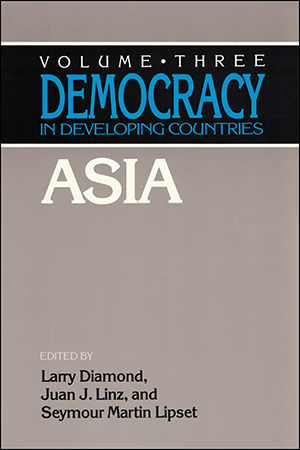In Volume 3 of the four-volume Democracy in Developing Countries, the authors follow a common analytical framework to trace the experiences with democratic and authoritarian rule and assess the underlying causes of democratic success and failure in ten Asian countries. Volumes 2 and 4 of the set cover Africa and Latin America. In Volume 1, Professors Diamond, Linz, and Lipset weigh the evidence from these case studies together with a wealth of other theoretical and comparative literature to present a comprehensive theory of the social, cultural, economic, and political factors that foster stable democracy. Eschewing reductionist and monocausal interpretations, they emphasize the interplay between constitutional and party structure, ethnic conflict, socioeconomic change, international constraints, political values and beliefs, and the behaviors, choices, and policies of political leaders. Both the case studies and the theoretical conclusions draw new attention to the relationship between state and society and the autonomy and vitality of social interest groups as important determinants of the democratic prospect.
Larry Diamond, senior research fellow at the Hoover Institution, has written numerous articles on Nigerian political history and politics. The late Juan J. Linz was Sterling Professor of Political and Social Science at Yale University. His work on authoritarianism, the breakdown of democratic regimes, and transitions to democracy had a wide-ranging impact not only on scholarship, but also in the world of politics. Seymour Martin Lipset holds the Hazel Chair of Public Policy at George Mason University.
"Researchers who want to know more about Asian political development will find this volume indispensable."—Studies in Comparative International Development
". . . illuminating analyses . . . a superb political history and analysis. . . . This book is the best recent general political history and analysis of individual Asian Countries, and therefore should be useful for students of comparative politics and country specialists."—Lucian W. Pye, Pacific Affairs
"A careful and mature comparative survey of the movement towards democracy of ten Asian sovereign states."—The Economic Times, New Delhi
Introduction: Persistence, Erosion, Breakdown and Renewal—L. Diamond.
India: Democratic Becoming and Combined Development—Jyotirindra Das Gupta.
Pakistan: Experiments with Democracy—Leo E. Rose.
Sri Lanka: Crises of Legitimacy and Integration—Urmila Phadnis.
Turkey: Crises, Interruptions, and Reequilibrations—Ergun Ozbudun.
The Philippines: The Search for a Democratic Solution, 1964-1986—Karl Jackson.
South Korea: Politics in Transition—Sung-joo Han.
Thailand: A Stable Semi-Democracy—Chai-Anan Samudavanija.
Malaysia: Quasi-Democracy in a Divided Society—Zakaria Haji Ahmad.
Papua New Guinea: The Melanesian Ethic and the Spirit of Capitalism, 1975-1986—David Lipset.
Indonesia: Past and Present Encounters with Democracy—Ulf Sundhaussen.






